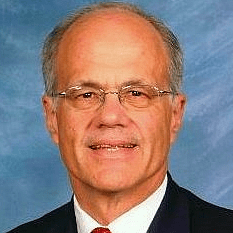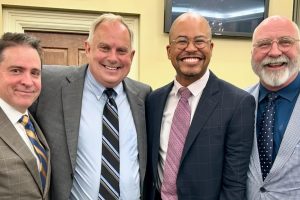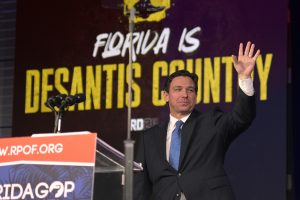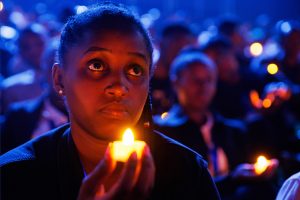 I once heard legendary teacher of pastoral care, Wayne Oates, say that some of Jesus’ instructions aren’t only demands for how we should live; they’re also descriptions of how we do live. As an example of what he meant, he pointed to this commandment from Jesus: “You shall love your neighbor as yourself.” It’s a clear mandate for us to care freely, justly and mercifully for our neighbors. It’s also an insight into the way things are. Over time, we tend to treat other people the way we treat ourselves.
I once heard legendary teacher of pastoral care, Wayne Oates, say that some of Jesus’ instructions aren’t only demands for how we should live; they’re also descriptions of how we do live. As an example of what he meant, he pointed to this commandment from Jesus: “You shall love your neighbor as yourself.” It’s a clear mandate for us to care freely, justly and mercifully for our neighbors. It’s also an insight into the way things are. Over time, we tend to treat other people the way we treat ourselves.
To care well for the people who need them, congregational leaders (pastors, other staff and volunteers) need – and they’re invited – to care for themselves. That’s true even (and especially) in a crisis.
Self-care involves compassionate attention to needs of our bodies.
We don’t just have bodies; we are bodies (more than bodies, of course, but bodies nevertheless). Marcus Aurelius said far too little for the body when he wrote, “You are a soul carrying around a corpse.” We’re not pearls waiting to be freed from our uncomfortable oysters or ghosts trapped in irrelevant machines.
Instead, our bodies and spirits are seamlessly woven together. We’re embodied spirits. “Emotional” and “spiritual” experiences are somehow and always physical. They fire across the synapses of our brains, flip the switches of receptor and transmitter nerves, catalyze and circulate hormones and register in our bodies.
Our irreducible physicality helps to explain why it’s difficult to do so-called “spiritual” things – like being patient, compassionate and centered – when we’re tired, or hungry and thirsty, or in pain. It’s harder to think clearly, decide wisely, feel truly and love well when we’ve neglected our bodies.
“It takes courage to be vulnerable, to acknowledge, ‘I don’t know what I’m doing.’”
During this crisis season, spiritual leaders scramble to provide unifying care for a scattered church; to lead virtual worship, offer online studies and programming; to encourage generous financial giving, while also acknowledging that many congregants are facing losses of income; and to provide meaningful care from a remote distance. Some leaders are climbing steep technological learning curves, navigating Zoom, Google Hangouts, Microsoft Teams, Facebook Live, YouTube, Vimeo and Slack, among many others.
As they scramble and climb, they carry not just concerns about the vitality and viability of their churches; they also bear burdens of their own current and anticipated losses, their anxieties about the sustainability of their own jobs, their worries about family and friends and, perhaps, their feelings of isolation and loneliness.
Always, but urgently in times of crisis, self-care includes obvious-but-easy-to-overlook practices like eating healthfully, getting enough sleep, exercising, spending time outdoors (while practicing social distancing) and, yes, playing. Christians, like our Jewish and Muslim neighbors, affirm that bodies are God’s good creations; and Christians see in Jesus an incarnation – an embodiment – of the grace, truth and character of God.
Our bodies are both gifts and means of communication; they deserve grateful and attentive care.
Self-care involves clarifying expectations, especially one’s own.
While “unprecedented” is certainly an overused word, I think it rightly applies to the novel coronavirus crisis. The vast majority of people now living haven’t faced circumstances quite like the ones before us.
The “Great Recession” of the late-2000s did not immediately and simultaneously shut down vast sectors of the economy. While unemployment grew, it did not spring, in a few weeks’ time, from very low to very high rates of joblessness. The terror attacks of 9/11/2001 sent shockwaves through the nation and the world, generated widespread fear and led to an ill-conceived war. But people could still gather to sing and lament, to celebrate unity and resolve, to demonstrate support for or dissent from the choices which their leaders made and to help displaced and grieving fellow citizens in New York City.
World War II called for multiple heroic sacrifices of engagement; now, we’re asked to do our part by disengaging, distancing and isolating. There are similarities between the COVID-19 pandemic and the influenza epidemic of 1918, but those who endured that awful outbreak of illness did not have the digital and social media tools we have to connect with one another or to relocate work – and church – to our homes and the world wide web.
In these unprecedented times, it’s important for all of us to remember that, because we’ve never been precisely here before, there is no template, map, app or handbook for the right way to lead and to be church. All of us, as we must, are making it up as we go, trying and failing, experimenting and succeeding, and learning what works and what doesn’t.
Even in more ordinary times, when things are far clearer than they are now, perfection is neither possible nor required. In these extraordinary days, when things are murkier than they’ve ever been, leaders can let themselves off the hook of unreasonable and unattainable expectations. Others might expect their congregational leaders to climb onto that hook of perfection, but it’s not necessary, or healthy, to do so. It’s possible to say a quiet, principled and determined “no” to expectations that are impossible and misguided to meet.
The late New Testament scholar and preacher Fred Craddock said often that he hoped “to live simply, to love generously, to speak truthfully, to serve faithfully, and to leave everything else to God.”
To be sure, it can be paradoxically complex to discern what it means to “live simply” in turbulent times, and here’s where we can find help in the very familiar Serenity Prayer, popularized by 12 Step Recovery Groups and written by theologian Reinhold Niebuhr:
“God grant me the serenity to accept the things that I cannot change, courage to change the things I can, and the wisdom to know the difference.”
There’s so much that none of us can change about the current crisis or about its known and yet-to-be-known effects on congregational life, on communities and on the most vulnerable people among us. It’s difficult for us to recognize that those things which pastors and other church leaders cannot constructively influence aren’t part of their responsibility. Part of their concern and prayers, yes, but not part of their responsibility.
There are things we can change, and they require courage – finding heart for them and putting our hearts into them. For example, leaders can change the isolation they feel by making contact with trusted friends, seasoned guides and valued fellow-travelers, and admitting to them that they need a listening ear, a sounding board or a companion in prayer. It takes courage to be vulnerable, to open-up about the anxieties which threaten to shut us down, and to acknowledge, “I don’t know what I’m doing.”
We can also invite each other to be honest about their feelings of insecurity, uncertainty and loss. It takes courage to break-through the “officially happy and upbeat” tone of much leadership and to speak more honestly and riskily about hard things.
There are also opportunities in this crisis to ask challenging questions about what it means to be and do church – to live and serve as followers of Jesus – in all times, not just these times. As all but essential things – and some essential things, too – get stripped-away, there is a chance for brave conversations about what among those lost ways might be necessary and, eventually, life-giving losses, not only for now but for the future.
We need wisdom to know the difference between the things we cannot change and the things we can. We nurture wisdom through regular practices of reading and study; engagement with thoughtful seekers; reflecting, praying, journaling and being still; and discernment-focused conversations with one’s faith community, even if those conversations must for now be virtual.
“Self-care is, in some ways, no more complicated and no less wonderful, than resting in the assurance that God holds us in strong-tender arms of love from which nothing in all creation shall separate us.”
Sometimes, urgent circumstances call for decisions which can’t be postponed. In those moments, pastors and other church leaders do the best they can. Then, when (and if) truer wisdom emerges, they can lead their congregations to modify decisions made under the pressure of nonnegotiable deadlines. At other times, though, to bind up their own anxieties about being and doing enough, leaders push themselves and others to make decisions too quickly. It’s better, I think, whenever possible to defer decisions about which sufficient wisdom hasn’t yet surfaced.
We’re free to expect from ourselves only what we can do; to admit; without shame or embarrassment what we cannot; and to ask for help, from God and from others, in discovering broader and deeper wisdom for ourselves and our congregations. Then we’re truly free “to leave the rest to God.”
Self-care involves, most crucially, remembering one’s essential identity as a bearer of God’s image, a child of God and a follower of Jesus.
We are not, most deeply and authentically, the roles we play, the jobs we have and the responsibilities we shoulder. We are, instead, bearers of God’s good image, with an ineradicable dignity and worth. We are who God declares us to be through our immersion in Jesus, our baptism in grace: “You are my beloved child, and I take great delight in you.” We are followers of Jesus, learning from him how to be, in the words of Irenaeus, “fully alive for the glory of God.”
Our primary calling is to honor in ourselves, as well as in others, the limitless value of having been fashioned in the image of God; to revel in freedom from feelings of shame, guilt and worthlessness; a freedom which is ours because God has adopted us and named us “beloved” in Jesus; and a freedom to stay in step with Jesus, being with him in order to become like him. This primary calling is a gift of divine love and grace, and leaders can care for themselves by nurturing their capacity to receive and enjoy it. All other callings, as valuable and important as they are, are secondary to that first and enduring invitation.
Pausing regularly, particularly in contemplative, meditative or reflective prayer, to hear again the truth of this gift will help to center and ground leaders in what matters most as they engage in work which matters greatly. They can recall that what God wants from them is rooted in what God wants for them.
Self-care is, in some ways, no more complicated and no less wonderful, than resting in the assurance that God holds us in strong-tender arms of love from which nothing in all creation shall separate us.
EDITOR’S NOTE: BNG is committed to providing timely and helpful news and commentary about ways Christians and churches are responding to the coronavirus pandemic. Look for the hashtag #intimeslikethese. You can also use this form to help us identify compelling stories of faith and ministry in these challenging times.
Read more BNG news and opinion on this topic:
#intimeslikethese






































































